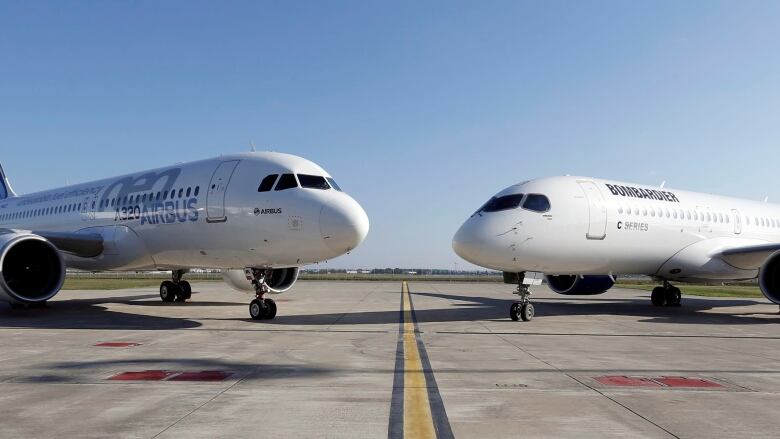Ottawa pushed Bombardier to partner with Airbus after Chinese merger was considered

The Canadian government encouraged Bombardier to make a deal with Airbus for its C Series planes to thwart a potential venture with Chinese investors, according to five sources familiar with the matter.
It signaled its preference for Airbus after Bombardier failed to reach an agreement with Boeing Co. earlier this year that would have given the U.S. company a stake in the C Series jetliners, according to the sources.
The Canadian government's role has not been previously reported. Prime Minister Justin Trudeau's administration took a calculated risk in steering Bombardier toward Airbus, according to the sources.
It helped save a key product for Bombardier and likely resolved a brewing trade dispute with the United States, but potentially set back efforts to improve trade and economic ties with China.
The deal with Airbus came at a critical time for Bombardier. Its $6 billion C Series program, already losing money, had become the subject of a trade dispute in which Boeing charged in a complaint to U.S. authorities that the jetliners benefited from Canadian government subsidies and unfair pricing.
Bombardier had considered a Chinese partnership as early as 2015, after talks about a possible merger with Airbus became public and fell apart. This year, as negotiations with Boeing over a C Series partnership faltered and concerns about the future of the program mounted, Bombardier's interest in a deal with China intensified, two sources said.
The prospect of such a deal raised concern within the Canadian government, two of the sources said, where officials believed jobs or technology could be "siphoned away" to China.
They also expressed uneasiness about what some saw as inadequate Chinese safeguards against intellectual property theft. In a series of calls with Bombardier in August and September, Innovation Minister Navdeep Bains and Trade Minister Francois-Philippe Champagne, as well as senior officials in Trudeau's office, urged Bombardier to contact the European company, the two sources said.
"From the federal government's point of view, anything was better than a link-up with China," according to an Ottawa source. The source said the government suggested to Bombardier that CEO Alain Bellmare reach out to his counterpart at Airbus, Tom Enders.
The government's efforts eventually helped pave the way for an Oct. 16 agreement in which Airbus took a majority stake in the narrow-body, medium-range C Series jets for one dollar.
But they also came at a time when Ottawa is pushing for closer economic ties with Beijing. Canada, concerned about Washington's threats to scrap the NAFTA trade deal, wants to bolster relations with China in order to cut its heavy dependence on exports to the United States.
Talks between Ottawa and Beijing are ongoing. Bombardier declined to discuss its C Series negotiations.
Representatives of Bains, Champagne and Trudeau declined to comment. Beijing officials declined to comment. Boeing also declined to comment. Asked whether Airbus had stepped in because of concerns about China obtaining a stake in the C Series, Airbus CEO Enders said: "We were obviously not privy to these discussions."

Bombardier's most recent discussions about a Chinese tie-up centered on Comac, a Chinese state-owned firm developing passenger jets, according to a source familiar with the Canadian company's thinking.
Financial terms of any potential deal were not known. Comac did not immediately respond to requests for comment. Sources said Comac was also among the companies Bombardier held talks with in 2015, along with national aerospace conglomerate AVIC and possibly a state-owned investment fund.
For Bombardier, a tie-up with the Chinese would have offered access to the world's fastest-growing aviation market, providing a boost to its struggling C Series program. Bombardier has not a secured C Series sale in 18 months. Inside Bombardier, however, executives worried that talks with potential Chinese partners were not moving quickly enough, according to sources.
With discussions stalled, Bombardier approached Boeing last spring, three of the sources said. Bombardier offered Boeing a stake in the C Series under similar terms to those later offered to Airbus, two of the sources said.
The U.S. company agreed to study the proposal, but eventually decided against it based on its experience with a troubled purchase of Canadian aerospace assets in the late 1980s. That once again Bombardier's focus back on a deal with the Chinese — until Ottawa pressed the case for discussions with Airbus over the summer.
Asked why senior Canadian federal officials suggested to Bombardier that it talk to Airbus, the Ottawa source said: "People felt that Bombardier might not have thought of this option, given the collapse of the earlier talks."
Officials from Airbus and Bombardier soon began what would be a series of meetings at restaurants in Paris, London and Munich. The meetings involved only four people — the two CEOs along with another executive from each company.
A representative of the Canadian government did not attend.